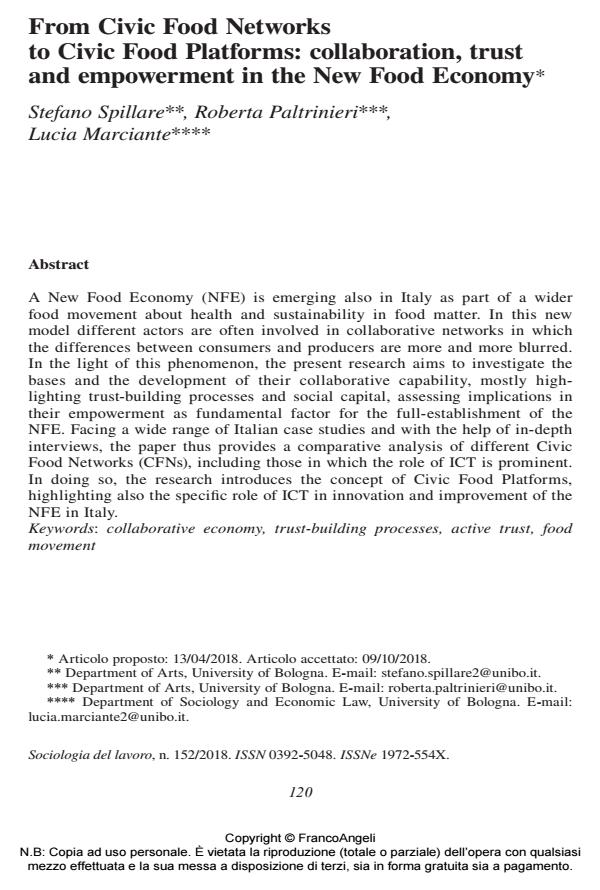From Civic Food Networks to Civic Food Platforms: collaboration, trust and empowerment in the New Food Economy
Journal title SOCIOLOGIA DEL LAVORO
Author/s Stefano Spillare, Roberta Paltrinieri, Lucia Marciante
Publishing Year 2018 Issue 2018/152
Language English Pages 17 P. 120-136 File size 116 KB
DOI 10.3280/SL2018-152007
DOI is like a bar code for intellectual property: to have more infomation
click here
Below, you can see the article first page
If you want to buy this article in PDF format, you can do it, following the instructions to buy download credits

FrancoAngeli is member of Publishers International Linking Association, Inc (PILA), a not-for-profit association which run the CrossRef service enabling links to and from online scholarly content.
A New Food Economy (NFE) is emerging also in Italy as part of a wider food movement about health and sustainability in food matter. In this new model different actors are often involved in collaborative networks in which the differences between consumers and producers are more and more blurred. In the light of this phenomenon, the present research aims to investigate the bases and the development of their collaborative capability, mostly high¬lighting trust-building processes and social capital, assessing implications in their empowerment as fundamental factor for the full-establishment of the NFE. Facing a wide range of Italian case studies and with the help of in-depth interviews, the paper thus provides a comparative analysis of different Civic Food Networks (CFNs), including those in which the role of ICT is prominent. In doing so, the research introduces the concept of Civic Food Platforms, highlighting also the specific role of ICT in innovation and improvement of the NFE in Italy.
Keywords: Collaborative economy, trust-building processes, active trust, food movement
- Networks, Markets & People Stefano Spillare, pp.176 (ISBN:978-3-031-74671-0)
- Enhancing Food Security by Institutionalizing Collaborative Food Alliances in Urban Areas Vibhas Sukhwani, Arie Nurzaman, Nadia Paramitha Kusumawardhani, Anwaar Mohammed AlHinai, Liu Hanyu, Rajib Shaw, in Sustainability /2019 pp.4103
DOI: 10.3390/su11154103
Stefano Spillare, Roberta Paltrinieri, Lucia Marciante, From Civic Food Networks to Civic Food Platforms: collaboration, trust and empowerment in the New Food Economy in "SOCIOLOGIA DEL LAVORO " 152/2018, pp 120-136, DOI: 10.3280/SL2018-152007